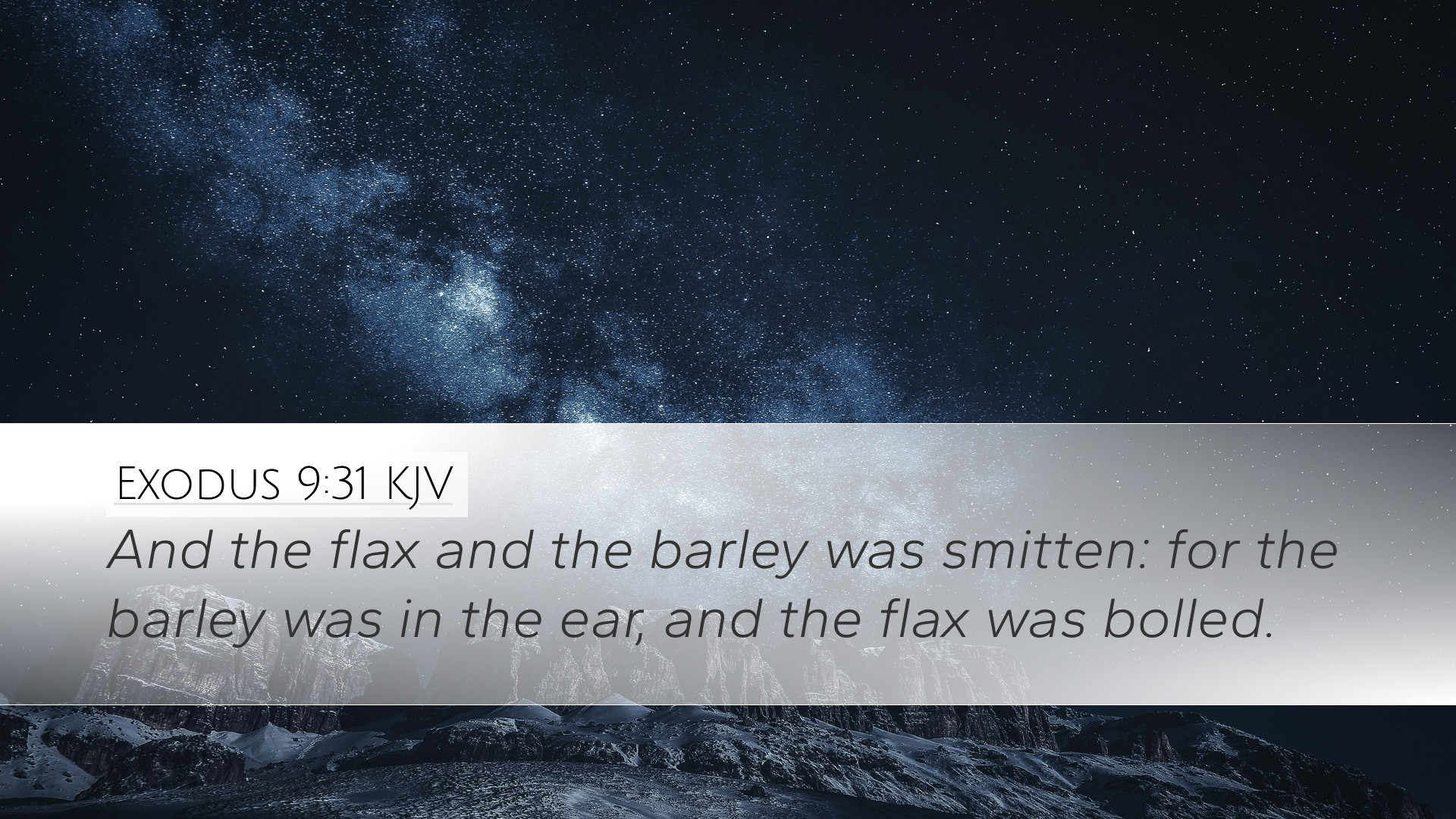Commentary on Exodus 9:31
Exodus 9:31 states, "Now the flax and the barley were struck, for the barley was in the ear and the flax was in bloom." This verse appears within the context of the plagues God unleashed upon Egypt, representing both historical and theological significance. Properly examining this verse requires delving into its implications regarding God's judgment and mercy, as well as understanding its agricultural and cultural context.
Contextual Background
The ninth plague, the plague of hail, is crucial for understanding the miraculous acts God performed to liberate the Israelites from oppression. This specific verse refers to the impact of the hailstorm on the Egyptian crops—particularly flax and barley. These crops were significant for both sustenance and economy. By explicitly naming the crops, the text conveys a message of God’s sovereignty over nature and the profound impact of His judgments.
Agricultural Significance
- Flax and Barley: Both crops held essential roles in ancient Egyptian agriculture. Flax was used for linen, which was a staple fabric for clothing, while barley was a primary grain not only for food but also for livestock feed.
- Timing of the Crops: The timing of this destruction was critical; barley was just beginning to ripen, and flax was in bloom. The destruction of crops at this stage indicated a deep loss for the Egyptians, as their food supply and economic stability would be severely compromised.
Theological Implications
This verse alludes to the broader theme of divine retribution. The destruction of the crops signals God’s judgment against Pharaoh and the Egyptians for their oppression of the Israelites. As Matthew Henry observes, “Nothing proves God’s omnipotence and justice more than His striking directly against those things that men put their trust in.” This indicates that the Egyptians were not just suffering physical loss but experiencing the futility of their reliance on earthly resources in the face of divine power.
Mercy and Judgment
While God’s judgment is evident, it’s also important to recognize the layers of mercy interwoven within these events. Adam Clarke emphasizes that through these afflictions, Egyptians were given an opportunity to acknowledge the Lord’s power. This duality of mercy and judgment reflects a theme prevalent in Scripture, where God often uses circumstances to turn the hearts of His people.
Spiritual Lessons
The account serves as a reminder for readers today regarding the nature of God’s discipline. It posits that when God permits, or even causes, destruction, it carries a higher purpose—often to redirect focus back to Him. Here are a few lessons:
- The Fallibility of Human Efforts: The Egyptians' reliance on their agricultural systems serves as a lesson on the fragility of human endeavors when detached from God’s will.
- Awareness of Spiritual Warfare: This passage demonstrates that the battle between good and evil extends beyond the physical realm; it involves the struggle for the souls of nations.
- The Call to Humility: The response to calamity can lead to repentance and a return to God, as the Lord often uses hardships to bring about spiritual awakening.
Pastoral Application
From a pastoral perspective, Exodus 9:31 can be a springboard for discussing the consequences of sin and God’s desire for reconciliation. Churches can focus on the nature of God’s discipline as both just and loving, encouraging congregations to examine their own lives for areas of pride or reliance on worldly systems rather than on God. Pastors might draw parallels between the spiritual lives of individuals and the agricultural concepts present in the text, illustrating that a life detached from divine nutrients cannot flourish.
Historical Context
Providing historical context is vital for understanding how the ancient Israelites viewed these events. As Adam Clarke noted, the plagues served as a testament to Israel's hope during their years of suffering in Egypt. Each plague unfolded a cosmic battle, revealing the insignificance of Egyptian gods before the God of Israel. This narrative would serve as a source of encouragement for the Israelites, indicating that their eventual liberation was imminent and divine.
Conclusion
Exodus 9:31 is a rich, multifaceted verse that speaks to God’s control over creation, His justice, and His mercy. Through this moment in Egyptian history, we are reminded of the power of God to act decisively within human affairs. For theologians, students, and pastors alike, this verse embodies a call to reflect on the relationship between divine judgment and human response. It serves as a powerful reminder of God's sovereignty and an invitation to trust in His overarching plan amidst trials and tribulations.


